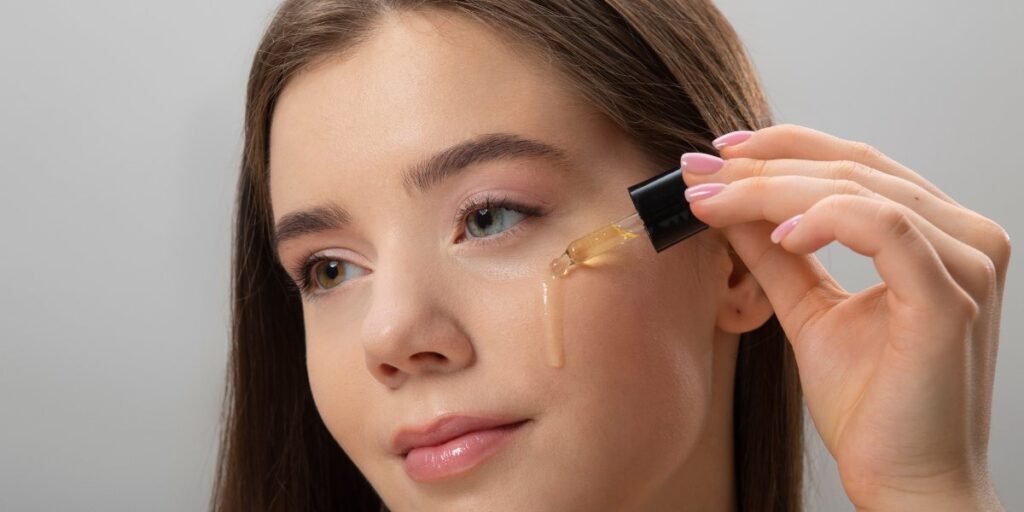Acne scars and hyperpigmentation are common skin conditions that can affect anyone. They result in uneven skin tone and dark areas long after the original lesions have healed.
Among the many treatments available, a potent weapon in the battle against chronic skin problems has emerged: vitamin C serum. This article explores the benefits of serum and explains why it works so well for reducing acne scars and hyperpigmentation.
Acne Scars and Hyperpigmentation: An Understanding
The term “hyperpigmentation” describes the darkening of the skin in specific regions brought on by an excess of melanin, the pigment that gives skin its color. Numerous variables, such as sun exposure, inflammation, and hormone changes, might contribute to this illness. Melasma, age spots, and post-inflammatory hyperpigmentation (PIH), which frequently follows acne, are common forms of hyperpigmentation.
On the other hand, acne-caused inflammation in the skin’s dermal layer leads to acne scars. These scars can appear as rolling scars, boxcar scars, icepick scars, hypertrophic scars, or keloid scars, among other shapes. One particular kind of acne-related discoloration that shows up as dark patches where acne lesions once were is called post-inflammatory hyperpigmentation.
Vitamin C’s Function in Skin Health
Ascorbic acid, another name for vitamin C, is a potent antioxidant that is essential for many body processes, including healthy skin. Free radicals are unstable chemicals that can damage cells and lead to aging and discoloration of the skin. Its antioxidant qualities aid in their neutralization. In addition, vitamin C promotes the manufacture of collagen, which is necessary to preserve the skin’s flexibility and structural integrity.
The Benefits of Vitamin C Serum Discoloration and Marks Left by Acne
Limits the Production of Melanin
One of the main reasons vitamin C works so well against hyperpigmentation is that it can prevent the synthesis of melanin. Tyrosinase is an enzyme essential for the formation of melanin, and vitamin C interferes with it. By decreasing the activity of this enzyme, Vitamin C helps prevent the creation of dark spots and promotes a more uniform skin tone.
Encourages the Production of Collagen
The protein collagen gives the skin structure and keeps it smooth and firm. Atrophic scars, in particular, are caused by the loss of collagen that occurs after an acne outburst. Over time, scars may become less apparent due to vitamin C’s promotion of collagen synthesis, which can aid skin renewal and repair.
Protection from Antioxidants
Vitamin C’s antioxidant qualities shield the skin from harm from free radicals and environmental aggressors, including pollution and UV rays. This defense is essential for maintaining the general health of the skin and halting more skin damage and hyperpigmentation.
Cuts Down inflammatory response
Because of its anti-inflammatory qualities, vitamin C can help calm the skin and lessen the redness and swelling of acne. Vitamin C calms the skin, which promotes healing and reduces the chance of post-inflammatory hyperpigmentation.
Enhances Tone and Texture of Skin
Using vitamin C serum regularly might result in smoother, more luminous skin. Its exfoliating qualities help remove dead skin cells and encourage cell turnover, which can enhance skin tone and texture and lessen the visibility of dark spots and scars.
Scientific Proof of the Beneficiality of Vitamin C
Numerous studies have shown that vitamin C is a helpful treatment for acne scars and hyperpigmentation. For instance, over 16 weeks, a vitamin C serum dramatically reduced the look of participants’ fine lines and hyperpigmentation, according to research published in the Journal of Clinical and Aesthetic Dermatology. Another study published in the Indian Dermatology Online Journal highlighted the advantages of topical vitamin C in lowering melanin synthesis and shielding the skin from UV-induced damage.
How to Get the Best Out of Vitamin C Serum Use
Select the Appropriate Focus
Vitamin C serums come in various concentrations, usually between 5% and 20%. To test the skin’s tolerance, beginners should start with a lesser dose (around 10%). Progressively raising the concentration can achieve better outcomes without irritating the skin.
Test a Patch
Before adding vitamin C serum to your regimen, do a patch test to ensure you don’t have an adverse reaction. To check for irritation, apply a small amount of the serum to a discrete region of skin and wait a day.
Use Appropriately
Serum should be used to treat clean, dry skin. Although it can be applied in the morning or evening, it is typically advised due to its antioxidant defense against environmental damage. If using the serum throughout the day, apply a moisturizer and sunscreen afterward.
The Secret Is Consistency
Using it consistently is essential to getting the benefits. It could take a few weeks to many months before hyperpigmentation and acne scars significantly improve. The best results will come from persistence and consistent application.
Keep in mind Appropriately.
Vitamin C’s efficacy can be diminished by light and air exposure. Ensure the bottle is securely closed, and store your serum in a cool, dark area. Many serums are packaged in opaque or airless containers to maintain their efficacy.
Possible Adverse Reactions and Safety Measures
Although vitamin C is typically safe for most skin types, some people, especially those with sensitive skin, may experience discomfort. Redness, itching, and a stinging sensation are signs of irritation. Stop using and see a dermatologist if you encounter these symptoms.
Irritation risk may also rise when Vitamin C is combined with other active substances like retinoids or exfoliating acids. It’s recommended to introduce one active component at a time and track your skin’s reaction.
To read more blog: Skin Whitening Products and dry damaged Hair
Final Thoughts
Vitamin C serum inhibits the generation of melanin, promotes collagen synthesis, and offers antioxidant protection, making it a highly effective treatment for acne scars and hyperpigmentation.
Because of its capacity to enhance skin tone and texture, it is a flexible addition to any skincare regimen. People can noticeably improve the appearance of their skin by applying serum consistently and appropriately, which can lessen the visibility of scars and dark spots for a more radiant, clear complexion.






crazybulk hgh-x2 review
References:
wehrle
dianabol only cycle reddit
References:
test dianabol cycle (http://king-wifi.win/)
hgh 4iu per day results bodybuilding
References:
Hgh Iu Dosage
buy online steriods
References:
complications from long term steroid use (https://datamine.himaribot.com)
which is better sermorelin or ipamorelin
References:
shelf life of ipamorelin
cjc 1295/ipamorelin peptide
References:
Ipamorelin And Hypothyroidism
cjc 1295 ipamorelin dosage per week
References:
does ipamorelin make you sleepy (https://codimd.fiksel.info/)
what is the cycle cjc 1295 / ipamorelin
References:
ipamorelin dosage and timing, https://mybusinessweb.in,
mod grf 1-29 100mcg and ipamorelin 100mcg every night
References:
ipamorelin dosing morning and afternoon